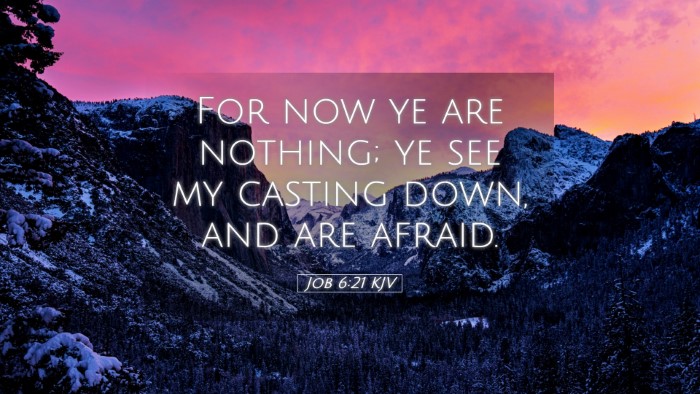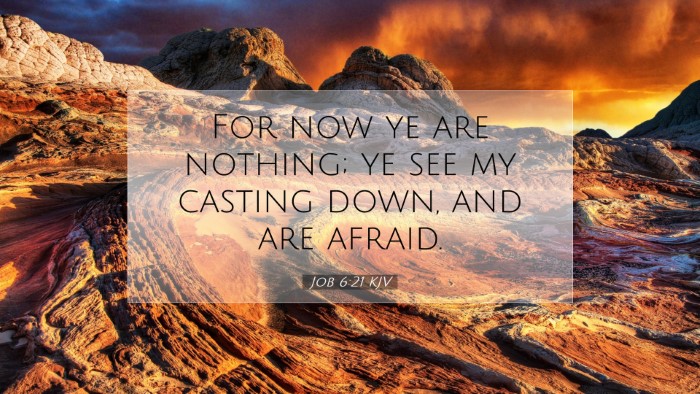Old Testament
Genesis Exodus Leviticus Numbers Deuteronomy Joshua Judges Ruth 1 Samuel 2 Samuel 1 Kings 2 Kings 1 Chronicles 2 Chronicles Ezra Nehemiah Esther Job Psalms Proverbs Ecclesiastes Song of Solomon Isaiah Jeremiah Lamentations Ezekiel Daniel Hosea Joel Amos Obadiah Jonah Micah Nahum Habakkuk Zephaniah Haggai Zechariah MalachiJob 6:21
Job 6:21 KJV
For now ye are nothing; ye see my casting down, and are afraid.
Job 6:21 Bible Commentary
Commentary on Job 6:21
Job 6:21 states: "For now ye are nothing; ye see my casting down, and are afraid." This verse echoes Job's lamentation and displays the profound relationship between suffering and the perception of truth. The context surrounding this scripture is pivotal for understanding its depth.
Contextual Overview
The book of Job addresses the theme of suffering and divine justice. Job, a man of integrity and faith, faces intense suffering which challenges his understanding of God’s righteousness. The dialogues between Job and his friends serve as the crux of this drama, exploring the nature of suffering and the human response to it.
The Nature of Job's Complaint
-
Job's Despair:
Job's statement illustrates a profound despair. He sees his friends as having failed to understand the gravity of his suffering, which makes them dismissive of his turmoil. Their incapacity to empathize causes Job to express a sense of isolation.
-
Realization of Truth:
Job recognizes that his friends, despite their intentions, are unable to grasp the depth of his situation. This acknowledgment reflects a broader theme of seeking companionship and understanding in times of trial.
Insights from Matthew Henry
According to Matthew Henry, Job’s assertion that "ye are nothing" indicates his friends’ inability to console him, illustrating a key theme in the discourse on suffering: the inadequacy of human wisdom in the face of divine mystery. Henry notes that Job is calling out the lack of substantial help from his friends, emphasizing their fear in witnessing his decline rather than providing assistance.
Insights from Albert Barnes
Albert Barnes emphasizes that Job's friends have merely observed his suffering, which provokes fear but does not lead to understanding. He interprets this fear as a response to the potential consequences they perceive in Job's afflictions. Barnes highlights the idea that they are consumed by their own trepidation rather than extending the empathy that Job so desperately needs.
Insights from Adam Clarke
Adam Clarke provides a critical look at the interpersonal dynamics during Job's suffering. He remarks that Job feels betrayed as his friends' fear has taken precedence over compassion. Job's plea is not just for understanding but also for genuine companionship in his anguish. Clarke suggests that this reflects a universal dilemma—how individuals respond to each other's pain and the biblical principle that empathy should dominate judgment.
Theological Reflections
- Human Limitations:
This verse encapsulates the frailty of human support systems. The disconnect between Job and his friends highlights that human wisdom is often insufficient in addressing deep-rooted suffering.
- The Role of Empathy:
Job's desire for empathy serves as a reminder to the church today about the imperative need for compassionate responses to those in pain. Ministers and congregants alike should consider how they engage with those who are suffering.
- Understanding God:
The verse challenges theologians to reconcile the apparent silence of God during suffering. It evokes deeper questions around the nature of divine justice and the human experience, inviting a dialogue on faith amidst trials.
Practical Applications
For pastors, this verse underscores the importance of non-judgmental companionship for individuals enduring hardships. It is a call to cultivate a ministry that prioritizes empathy over dogma.
Students of scripture can use this passage as a case study on the complexity of human emotions in the face of suffering. It allows for exploration into how theological teachings may inform contemporary understandings of pain.
Theologians are encouraged to dissect the implications of Job’s plight, examining not just the narrative of suffering but also the discourse on divine mystery and human response.
Conclusion
Job 6:21 serves as a powerful reminder of the human condition—our vulnerability in suffering and the necessity of empathy. Through the insights of Matthew Henry, Albert Barnes, and Adam Clarke, congregants, scholars, and pastors are encouraged to foster understanding, compassion, and courage as they face their tribulations and support others in theirs.


